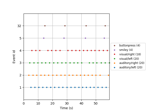mne.write_events#
- mne.write_events(filename, events, *, overwrite=False, event_list=None, verbose=None)[source]#
Write events to file.
- Parameters
- filename
str Name of the output file. If the extension is .fif, events are written in binary FIF format, otherwise (e.g., .eve, .lst, .txt) events are written as plain text. Note that new format event files do not contain the “time” column (used to be the second column).
- events
arrayofint, shape (n_events, 3) The array of events. The first column contains the event time in samples, with first_samp included. The third column contains the event id.
- overwritebool
If True (default False), overwrite the destination file if it exists.
- event_list
array, shape (n_events, 3) Deprecated, use argument events instead.
- verbosebool |
str|int|None Control verbosity of the logging output. If
None, use the default verbosity level. See the logging documentation andmne.verbose()for details. Should only be passed as a keyword argument.
- filename
See also
